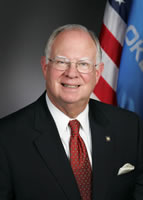In order to provide equal access and equal opportunity to people with diverse abilities, this site has been designed with accessibility in mind. Click here to view
Ford To Push Education Reform, Higher Standards
 Sen. John Ford
Sen. John Ford
As Chairman of the Senate Education Committee, State Senator John Ford said Tuesday that education reforms are needed to move Oklahoma’s education system forward.
Ford said the education legislation proposed will enhance our ability to provide quality education to the children of Oklahoma. This legislation will include removing many state mandates from local school districts, increasing the transparency and accountability of student achievement data, and empowering parents with more ability to direct their children’s education.
“Oklahoma has an opportunity to provide an education system that will give our children the education they deserve as efficiently as possible,” said Ford. “In addition, it is important that the local school districts and parents have a greater say in their children’s education.”
Ford, R-Bartlesville, introduced Senate Bill 834, the School District Empowerment Program, which will remove many of the mandates the state has forced on the backs of the local school districts. This legislation is based on conversations with school board members, local superintendents, parents and business leaders across our state.
“The locally elected school boards and their districts know what is best for their students and how to provide a quality education,” said Ford. “The state will continue to set high standards for the education of our youth, and will work with the local districts to assist them in meeting these standards.”
Senator Clark Jolley, R-Edmond, Senate Education Committee Vice Chairman, announced last week that he will also aid in bringing reform to Oklahoma’s education system. Jolley’s Senate Bill 1111 restructures Oklahoma’s education system to create improved oversight on testing. A study conducted by the Oklahoma Business and Education Coalition (OBEC) supports the need for Jolley’s legislation, which will restructure the current Office of Accountability into the Education Quality and Accountability Office.
The study conducted by OBEC is titled “Organizing Effective Educational Accountability: The Case of Oklahoma,” and Jolley says it provides clear guidance for a path Oklahoma can choose to take to improve accountability and transparency.
“This study clearly shows a path to improvement that needs all parties involved,” said Jolley. “We understand that testing should not be a ‘gotcha’ process that punishes students in need of improvement. Instead, it should be a measure of where we stand as a state and a guide on how to get where we need to be.”
Senator Judy Eason McIntyre, D-Tulsa, also recognized the need for improvement in education by co-authoring Jolley’s SB 1111 and authoring Senate Bill 882, the “Oklahoma Equal Opportunity Educational Scholarship Act,” which enhances the ability of parents to have a greater say in their children’s education.
Ford praised Eason McIntyre for her legislation that provides education opportunities to those students in low-performing schools and those with special needs. “I thank Senator Eason McIntyre for her innovative approach to providing all students, regardless of their situation, a beneficial learning experience,” said Ford.
With legislation recently filed regarding home schooling families, Ford agrees that protecting the right to home school is also important to educating Oklahoma students.
“Our home school community is a vital asset to this state,” said Ford. “The way home schooling parents currently educate their children is a process that has worked fine, and I feel it is important for them to have the freedom in determining what will best serve their children’s needs.”
 Oklahoma Senate
Oklahoma Senate

